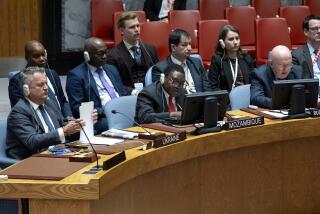Hussein Is Getting the Last Laugh
- Share via
WASHINGTON — In light of the present trend of events regarding Iraq, one could be forgiven for asking: Who’s containing whom? Virtually all the continuing multilateral actions in the United Nations Security Council have the effect of reinforcing the legitimacy of Saddam Hussein’s regime. Moreover, as Iraq continues to expand its oil capacity, and its contracts grow under the U.N.’ s “oil-for-food” program, some members of the Security Council have an increasing stake in keeping the Iraqi president around. This has clearly been a large part of Iraq’s strategy of dividing the United States from its allies and other members of the Security Council.
Meanwhile, the United States, virtually alone, spends billions of dollars to keep Hussein in check. Imagine security in the region if U.S. forces withdrew. Except for the British (and they’re increasingly wobbly), the rest of the permanent members of the Security Council contribute only criticism as they compete to win favor and lucrative contracts from Iraqis. The remaining council checks on Iraq include sanctions, which are eroding, and control of Iraq’s legal oil-export revenues. These funds go to an escrow account, and the U.N. must approve any expenditure by Iraq. This is the last serious U.N. constraint on Baghdad’s grander military visions.
The Europeans seem convinced that pragmatism and commercial interests dictate that they must work with Hussein. Much of this is rationalized by the need to reverse the harm to Iraq’s civilian population that sanctions cause. The United States, they are convinced, has no choice but to remain vigilant in the region in case the Iraqi leader gets aggressive again. Hence, they can afford, and indeed profit, from being relatively open to the regime.
Given Hussein’s track record and undiminished ambitions, the future does not look good. His regime has an exquisite sense of the value and use of power. Toward that end, it has acquired and now retains weapons of mass destruction. The same logic drives its oil policy. Iraq’s oil minister, Gen. Amir Mohammed Rashid, has said he can more than double current production capacity--up to 6 million bar rels a day--in three to four years. Iraq’s goal is to supplant Saudi Arabia as the dominant force in the Organization of Petroleum Exporting Countries. It is worth noting that the same Rashid had a leading role in directing the successful development of Iraqi weapons-of-mass-destruction programs in the 1980s. His wife, Rihab Taha, ran the biological-weapons program.
The Security Council provides the resources. It now allows Iraq to spend $1.2 billion a year renovating oil infrastructure. Economies in the West demand more oil, and they grow faster with energy prices lower. Iraq knows it has a powerful lever, and it intends to make it more powerful. The question the next U.S. administration will face is: Can we accept a future with Hussein in control of weapons of mass destruction and a sizable fraction of the world energy market? Iraq already is using the power of its oil capacity by throttling back its oil exports.
Some council members focus narrowly on the Iraqi weapons threat and argue that a proposed monitoring organization would limit Hussein’s weapons of mass destruction. This is highly dubious. Iraq refuses to permit U.N. inspectors in the country. Why should it? The regime is doing well following a strategy of sanctions erosion. Even if it did allow inspectors in, would the Security Council suspend sanctions and give the checkbook back to Hussein? If the council did so, the first thing Hussein would do is toss out the inspectors again if they were the slightest bit intrusive or effective.
The United States appears to be losing its influence on this issue. It has been addressing the Iraq problem through the Security Council with the noble objective of obtaining a multilateral, collective response. For several years, this more or less worked. However, the interests of other countries have evolved, and Iraq has successfully lured them away.
What is worse, the actions of other council members are driven increasingly by the objective of containing the United States. Drawing the United States into the Security Council is an opportunity to achieve equal footing with this “hyperpower,” as French Foreign Minister Hubert Vedrine castigated the U.S. For the United States, the Security Council can become a voyage to Lilliput where the Lilliputians are quick-witted, nimble and can tie the United States up quite handily. This is not to say that the Security Council is without merit, simply that collective action has its limits.
In the case of Iraq, the incremental decisions by the council that effectively re-empower Hussein will make it inevitable that the United States enact unilateral policies and actions, one way or the other. The next U.S. administration will have to make a hard decision as to whether it considers Hussein’s regime inevitable, and if not, some tough steps will be in order. *
More to Read
Sign up for Essential California
The most important California stories and recommendations in your inbox every morning.
You may occasionally receive promotional content from the Los Angeles Times.













